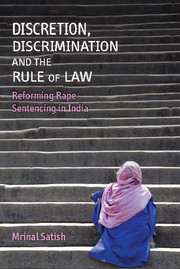Book contents
- Frontmatter
- Dedication
- Contents
- Acknowledgements
- Abbreviations
- 1 Introduction
- 2 An Introduction to the Indian Criminal Justice System
- 3 The Law and Practice of Rape Adjudication in India
- 4 Rape Sentencing: An Empirical Analysis
- 5 Myths and Stereotypes in Rape Prosecutions
- 6 Structuring Sentencing Discretion: Guideline Models and Approaches
- 7 Sentencing Discretion in India: The Need for Structuring
- 8 Sentencing Guidelines for Rape
- Appendix 1 List of Cases Studied for Empirical Analysis
- Appendix 2 Templates of Format Used for Medical Examination of Rape Victims
- Appendix 3 Overview of Variables Considered for Empirical Study and Data Obtained
- Appendix 4 Output of Regression Analysis
- Appendix 5 Charts
- Table of Cases
- Bibliography
- Index
8 - Sentencing Guidelines for Rape
Published online by Cambridge University Press: 23 July 2017
- Frontmatter
- Dedication
- Contents
- Acknowledgements
- Abbreviations
- 1 Introduction
- 2 An Introduction to the Indian Criminal Justice System
- 3 The Law and Practice of Rape Adjudication in India
- 4 Rape Sentencing: An Empirical Analysis
- 5 Myths and Stereotypes in Rape Prosecutions
- 6 Structuring Sentencing Discretion: Guideline Models and Approaches
- 7 Sentencing Discretion in India: The Need for Structuring
- 8 Sentencing Guidelines for Rape
- Appendix 1 List of Cases Studied for Empirical Analysis
- Appendix 2 Templates of Format Used for Medical Examination of Rape Victims
- Appendix 3 Overview of Variables Considered for Empirical Study and Data Obtained
- Appendix 4 Output of Regression Analysis
- Appendix 5 Charts
- Table of Cases
- Bibliography
- Index
Summary
Introduction
In the previous chapter, I proposed that a Sentencing Commission be set up for India, with the mandate of drafting sentencing guidelines. I discussed the various steps that the Commission shall take while drafting guidelines. In this chapter, I discuss how I think the Commission should proceed in drafting guidelines for rape sentencing. In doing so, I draw upon the results of my empirical study, where I had identified the causes for unwarranted disparity. I apply to rape sentencing, the guidelines framework that I had suggested in the previous chapter.
Current Statutory Framework and Identifying a Theory of Punishment
As I have noted earlier, the maximum punishment for rape simpliciter under the Indian Penal Code is imprisonment for life. Till recently, the ‘minimum’ punishment was 7 years. These so-called ‘minimum’ sentences, however, were not true minimums because judges were permitted to impose a lower sentence if they provided ‘adequate and special reasons’ for doing so. In cases of aggravated rape (child rape, custodial rape, gang rape, rape of a pregnant woman), the maximum sentence is life and the ‘minimum’ sentence till recently, was 10 years. Hence, the Penal Code provides a range for punishment in both rape simpliciter and aggravated rape. The Code does not, however, provide any principles, guidelines, or list of considerations that courts should attend to in sentencing rape cases.
In order to decide on a list of factors that are relevant to sentencing, as well as to decide on aggravating and mitigating factors for a particular offence, it is essential that the Commission first identify a primary theory of punishment governing the offence in question. I do not advocate using only one theory of punishment in framing sentencing guidelines. As in the Israeli sentencing guideline model that I have discussed in Chapter 6, I propose identifying a primary justification for punishment. Other justifications for punishments may also play a role in determination of sentences, as long as these justifications do not detract from the objectives of the primary theory. Under this model, the inter-relationship between the theories would have to be specified, for avoiding confusion and consequently, further unwarranted disparity.
Information
- Type
- Chapter
- Information
- Discretion, Discrimination and the Rule of LawReforming Rape Sentencing in India, pp. 187 - 207Publisher: Cambridge University PressPrint publication year: 2016
